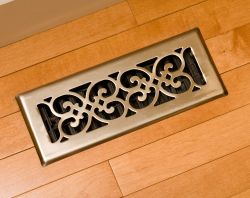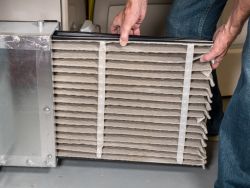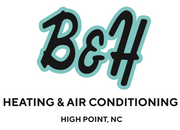How to Help Your HVAC System Run More Efficiently

From frigid winters to sweltering summers, you rely on your HVAC system to keep your home comfortable throughout the year. To maintain a desirable temperature, your system should be running at optimal performance. Adjusting common household habits, taking care of your heating and cooling units, and calling your HVAC contractor when necessary will all contribute to the efficiency of your system. Here’s how you can ensure your HVAC system runs smoothly all year.
8 Tips to Boost the Efficiency of Your HVAC System
1. Check Your Insulation
Insulation works by slowing the flow of heat in and out of the building. If your home is not properly insulated, you could be losing a lot of heat and cold air throughout the year. Leaks can form at various points in the heating and cooling process, from the unit and ductwork to drafty windows and attics. Even the most efficient HVAC system will waste energy when air can escape. Where you can, take a look at your insulation system. Patch up any cracks or holes with a foam filler. If they are not already, you should have your air ducts professionally sealed and insulated to avoid leaks.
2. Upgrade Your Thermostat
 There are certain times and circumstances where you will not need your heating or cooling system to work as hard. Homeowners can save money on utility bills and give their HVAC system a break by turning the thermostat down while they are asleep, away at work, or on a trip. The U.S. Department of Energy recommends setting the temperature to 68°F while you are awake and home during the winter, then lowering it by 7°-10°F when you are asleep or away. In the summer, set your thermostat to 78°F when you need air conditioning and increase it by 7°-10°F when you do not.
There are certain times and circumstances where you will not need your heating or cooling system to work as hard. Homeowners can save money on utility bills and give their HVAC system a break by turning the thermostat down while they are asleep, away at work, or on a trip. The U.S. Department of Energy recommends setting the temperature to 68°F while you are awake and home during the winter, then lowering it by 7°-10°F when you are asleep or away. In the summer, set your thermostat to 78°F when you need air conditioning and increase it by 7°-10°F when you do not.
It can be difficult to remember to do this manually each day, so consider investing in a programmable thermostat. These thermostats adjust to your desired temperatures on a schedule you set yourself. If unusual circumstances arise, you can manually override the settings temporarily without removing the usual schedule. Custom settings will ensure your heating and cooling systems will get a break when you do not need them, saving you money while continuing to keep your family comfortable.
3. Make the Work Easier
Air conditioners and heaters can be expected to handle most of the cooling and heating, but they do not necessarily need to work alone. There are small adjustments you can make to your home to help your system out. During the summer, set your thermostat higher and supplement the air conditioner with fans. Stay hydrated and wear light clothing to feel cooler, and try to minimize the number of appliances and electronics running. These can generate a significant amount of heat. Use window coverings such as blinds, blackout curtains, and window tinting to reduce the heat and sunlight entering your home.
When the temperatures begin to drop, remove the coverings from your windows and allow the sunlight in. Layer up and wear warmer clothes, use blankets, and eat warm foods. Try to cook using the oven more often to generate heat. Creating a cozier environment will allow you to turn your thermostat down, assisting your heater without sacrificing warmth.
4. Move Obstructions
 Many homeowners forget to factor registers, vents, and radiators into their home design plans. This often leads to furniture and rugs obstructing airflow and preventing the HVAC system from working properly. Blocking airflow will make it more difficult for your air conditioner or heater to reach your set temperature, as some rooms will be warmer or cooler than others. Your system will struggle to balance out these differences. Not only will this result in energy loss, but it will also make your system work harder, shortening its lifespan. Ensure nothing is covering or blocking your vents, registers, or radiators.
Many homeowners forget to factor registers, vents, and radiators into their home design plans. This often leads to furniture and rugs obstructing airflow and preventing the HVAC system from working properly. Blocking airflow will make it more difficult for your air conditioner or heater to reach your set temperature, as some rooms will be warmer or cooler than others. Your system will struggle to balance out these differences. Not only will this result in energy loss, but it will also make your system work harder, shortening its lifespan. Ensure nothing is covering or blocking your vents, registers, or radiators.
5. Install Door Sweeps
If there is a gap underneath doors to the garage or outside, the resulting draft can cause air from the outdoors to seep in and heat from your home to leak out. Avoid drafty doors in the winter with a door sweep. These nylon attachments are built long and thin to attach snugly along the inside bottom edge of the door. They can be installed on any door leading outside. Garages also tend to lose a lot of heat during the winter, but you can keep them warmer by attaching a rubber garage door gasket along the bottom edge of the door.
6. Change Filters Regularly
Replacing the air filter is a  critical but often neglected part of HVAC maintenance. Filters are designed to stop contaminants and debris like dust, dirt, pollen, bacteria, and mold from entering the air in your home and infiltrating your HVAC system. Over time, these substances can accumulate beyond what the filter can hold. At this point, dirty air will blow into your home and system, causing various problems. Indoor air pollution from dirty filters may cause allergic reactions and sinus congestion in those with allergies to pollen, mold, and dander or respiratory symptoms in conditions like asthma.
critical but often neglected part of HVAC maintenance. Filters are designed to stop contaminants and debris like dust, dirt, pollen, bacteria, and mold from entering the air in your home and infiltrating your HVAC system. Over time, these substances can accumulate beyond what the filter can hold. At this point, dirty air will blow into your home and system, causing various problems. Indoor air pollution from dirty filters may cause allergic reactions and sinus congestion in those with allergies to pollen, mold, and dander or respiratory symptoms in conditions like asthma.
Changing your filters regularly will help improve the air quality of your home. Most households should replace their filters once every three months, but depending on the occupants and your lifestyles, you may need to do so more or less often. For example, if you have pets, live in an area with more pollution, or suffer from allergies, monthly filter replacements would be more appropriate. In contrast, someone living in a small home on their own who is frequently out of town would only need to change it every six months.
Filter replacements are generally a maintenance task you can handle on your own. However, if you do not feel comfortable doing it yourself, have an HVAC contractor do it for you.
7. Adhere to the 20 Degree Spread
The 20 degree spread states that your temperature inside should be set no lower than 20 less than the temperature outside. If it is 87°F out, for instance, you will keep your thermostat at 67°F or higher. This rule is meant to prevent your HVAC system from working too hard. Expecting your air conditioner to lower the temperature by more than 20°F places a considerable amount of strain on it, and your unit may not even be able to reach that temperature. Overworking your system puts it through extra and unnecessary wear and tear. Your unit might require repairs from an HVAC contractor or break down sooner than expected.
8. Schedule Regular Maintenance
One of the best steps you can take for your system is scheduling servicing on both your air conditioning and heating systems at least once a year. Your HVAC contractor will complete a visual inspection of your system to search for any problems, such as faulty components or inconsistent heating or cooling. They will test a variety of parts and functions and perform a tune-up. This checkup will confirm that your system runs smoothly and will continue doing so until your next service appointment.
Now is the time to report any recent issues you may have noticed. Strange smells, loud noises, and leaks are common symptoms of a larger problem that a technician can solve. They may complete simple repairs then and there, but if there is a more in-depth fix involved, they might need to schedule another appointment at a later date. If a system is older or has several problems that require expensive repairs, a new HVAC installation may be recommended.
For quality HVAC system maintenance and repairs, you can count on B & H Heating & Air Conditioning. Serving High Point, NC, and surrounding areas, this contractor offers prompt and efficient residential HVAC services to fit within your budget. Their team of highly trained technicians is dedicated to finding you the best solutions for your unique needs, whether you require emergency HVAC service or a complete system replacement. Contact the HVAC contractor at (336) 841-5050 to receive a free estimate. To learn more about their services, visit them online.
About the Business
Have a question? Ask the experts!
Send your question

